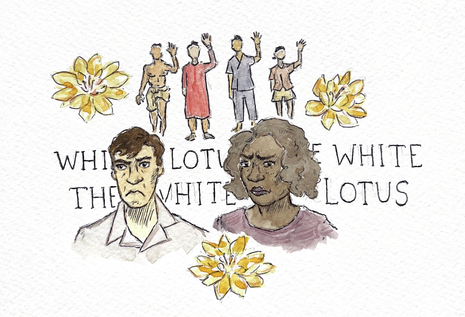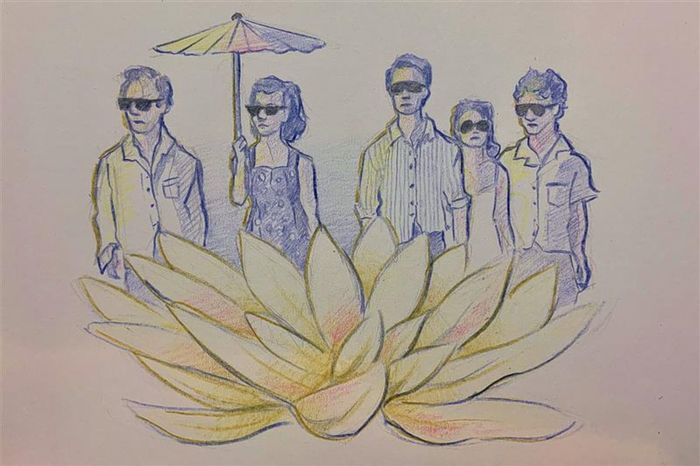The White Lotus is a trip (and a stumble)
Amanda Ljungberg returns to The White Lotus after the finale to assess whether it lives up to its previous seasons

We conclude season 3 of The White Lotus with perhaps the most tempting, inevitable question arising from the anthology format: does it measure up to the seasons preceding it? The consensus online (one I largely share) is no. This has been the weakest season, and yet it has also been the most widely viewed, thus the most discussed. Perhaps these facts are entwined: as Mike White’s vision grows in scale and fame, it seems also to strain beneath the weight of its own success.
As I noted when the season premiered, one of the clearest issues here is the heavy presence of vested interests, most notably the Thai tourism board. Our backdrop feels, as I feared, much more like an advertisement than a living, breathing part of the show’s ecosystem. The Songkran Festival sequence stands out as an utterly irrelevant set piece, a colourful setting that is entirely disconnected from the plot, leaving the festival’s rich cultural and spiritual significance untapped. A missed opportunity such as this gestures towards a newfound laziness, a troubling willingness to capitulate to external demands for empty imagery which undermines its own ambitions. Mike White ticks off his contractually obligated cultural checkboxes with unusual clumsiness, putting such a sheen on Thailand that much of the authenticity, menace, and artistic backbone of the series is lost in the process. Nowhere is this more laughably egregious than in the lingering shots of the Grand Palace in Bangkok, captured from two different flattering angles, with signage perfectly in frame for future tourists to mark in their guides. This season delivers what the tourism board paid so handsomely for, but great marketing seems to come at the cost of great drama.
“Why Thailand? This season never really answers that question”
The dialogue and commentary remain characteristically sharp, with online discourse predictably gravitating towards the controversial and provocative (incest, Sam Rockwell, suicide). However, broader intentions seem to get lost, both amidst the noise of a growing viewership and within the sprawl of ever-increasing plotlines. There are glimpses of deeper engagements with spirituality, particularly through Timothy Ratliff (Jason Isaacs), who stands out as one of the more textured figures of the season. But the thematic thread of Buddhism, and its distinct role in Eastern society, is barely skimmed. The tension between setting and ensemble is at the core of The White Lotus’ identity, which brings us back to the fundamental question – why Thailand? This season never really answers that question. Failing that is failing to justify its very existence. With little more than ornamental engagement with its setting and local characters (Gaitok and Pornchai, our most prominent locals, remain surface-level; Pornchai in particular ends up embodying the image of the polite, accommodating hotel worker which previous seasons deconstructed) the burden of substance shifts onto the guests, the themes, and relationships fostered within the insulation of the hotel.
“Many compelling threads gradually fizzle out without resolution”
Our cast comprises talented performers and stories brimming with potential, but the scope has expanded so that few are given the time or depth to resonate. Perhaps skimming a wider array of concepts befits a show preferring implication to overt exposition. However, this season feels less equipped to strike this balance, tossing up a host of complex seeds and largely leaving them to drift. Many compelling threads gradually fizzle out without resolution, and the few that do conclude – notably Rick’s – do so in uncharacteristically conventional and predictable ways. Dealing a heavy, explicit hand to some stories, and leaving others so briefly sketched that they barely register at all, leaves viewers with a strange and unsatisfying mix of overstatement and thematic vagueness. Perhaps the meandering pace and unresolved tensions were intentional, reflecting the unpredictability of life, critiquing our restless impulses to understand and rationalize. Equally, this might simply be a season bogged down by external obligations and a creeping lack of purpose.
Ultimately, these are frustratingly interesting ideas lacking the commitment to meaningful exploration, asking us to supply a depth the show no longer consistently delivers. To some end, this faith in the audience has always been part of what makes The White Lotus so rewarding to watch, but here it feels less like a challenge and more like a deflection. Season 3 is still enjoyable and stimulating, but feels loose, bloated, and uninspired. It lacks the sharpness of season 1 and the daring of season 2. Intentional irresolution seems a weak argument – perhaps it is time we begin to point out miscalculation, overambition, and a hurried need to satisfy sponsors when we see it. The White Lotus has, for now, fallen partial victim to the very forces it once critiqued, of complacency, compromise, and the loss of critical edge in the face of fame and commercial success. One can only hope that this is a temporary stumble, and not the first sign of a deeper rot setting in.
Want to share your thoughts on this article? Send us a letter to letters@varsity.co.uk or by using this form
 News / Judge Business School advisor resigns over Epstein and Andrew links18 February 2026
News / Judge Business School advisor resigns over Epstein and Andrew links18 February 2026 News / Gov grants £36m to Cambridge supercomputer17 February 2026
News / Gov grants £36m to Cambridge supercomputer17 February 2026 News / CUCA members attend Reform rally in London20 February 2026
News / CUCA members attend Reform rally in London20 February 2026 News / Union speakers condemn ‘hateful’ Katie Hopkins speech14 February 2026
News / Union speakers condemn ‘hateful’ Katie Hopkins speech14 February 2026 News / Hundreds of Cambridge academics demand vote on fate of vet course20 February 2026
News / Hundreds of Cambridge academics demand vote on fate of vet course20 February 2026










